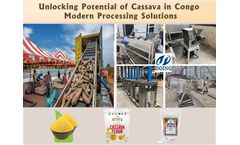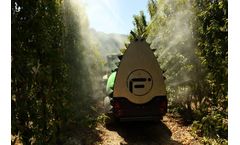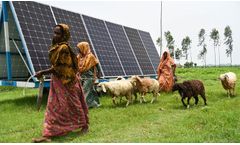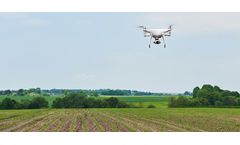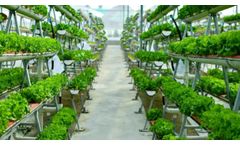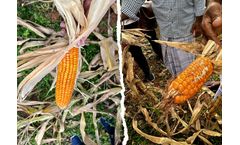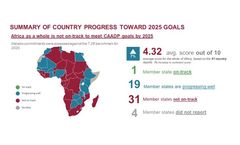Refine by
Food Security Articles & Analysis
378 news found
Cassava is one of the most important staple crops in the Congo, providing food and income for millions of households. However, the full potential of cassava in Congo remains largely untapped due to traditional farming and processing methods. At Henan Jinrui, we believe that with the right modern processing solutions, the cassava industry in Congo can be transformed into a ...
Embracing improved processing technology is critical for achieving sustainable food security in Nigeria.The Bottlenecks in Traditional Cassava Processing TechnologyNigeria’s food security struggles are rooted in cassava’s perishability and inefficient handling:- Rapid Spoilage: Fresh roots deteriorate within 48 hours, forcing ...
This active role is meant to increase the competitiveness, profitability and sustainability of the specialty crops sector, as well as offering real traceability and maximizing society’s food ...
The International Water Management Institute (IWMI) has launched the second phase of the Solar Energy for Agricultural Resilience (SoLAR) project. Running from July 2025 until December 2029 and supported by the Swiss Agency for Development and Cooperation (SDC), the project expands its geographical and thematic scope to deepen climate resilience and agricultural transformation of small holder ...
This article evaluates the technical construction and economic viability of establishing a cassava processing plant in West Africa, addressing food security and income generation. Construction Framework of Cassava Processing Plant in Africa 1.Site Selection Criteria: Proximity to cassava farms (<50km), road accessibility, stable electricity/water supply ...
Strong and Growing Demand for Garri Garri is a staple food in Nigeria, consumed daily in various forms such as Eba, soaked garri, and garri snacks. ...
These events are disrupting agricultural productivity, threatening food and water security, and undermining rural livelihoods across the country. ...
Speaking on behalf of the company, Isla, one of Lifeasible’s representative speakers, shared: "We are committed to providing reliable, cutting-edge technologies to improve food security and agricultural sustainability. With years of experience in plant pathology research and a dedicated team of scientists, our Fungal Disease Control Services are ...
Rising global temperatures, changes in precipitation patterns, and extreme weather events threaten food security as they alter crop cycles, heightening the risk of droughts and extreme rainfall, and shifting the distribution of pests and diseases. ...
ByIdrica
Jordanian women are overcoming societal and professional barriers to lead in water science, engineering, and agriculture. Their work in research and innovation is driving sustainable solutions and highlighting the need to close the gender gap in STEM for a more inclusive future. Jordan has made significant strides in encouraging women to pursue science, technology, engineering and mathematics ...
The Hanging Gardens, a symbol of visionary engineering and an early intuition of harmony between humans and nature, celebrated beauty and prestige; modern vertical farms, on the other hand, address urgent contemporary challenges such as growing urbanization, food security, and climate change. The concept, first outlined in the 1990s by environmental biologist ...
Due to climate change, regions across Asia and Africa are experiencing higher frequencies of floods and drought. Coupled with rising temperatures, traditional crop-growing patterns have been altered, delayed, and disrupted. A subsequent decline in crop quality and quantity has shown macro-scale impacts on agriculture, vegetable markets, and local community ...
IWMI presented recent scientific advances and innovative solutions developed with local partners to improve water productivity, availability, and overall resilience of Morocco’s three main river basins: Souss-Massa, Bouregreg, and Oum Er-Rbia. In the central-western part of Morocco, the Souss-Massa basin grapples with dwindling freshwater resources resulting from prolonged drought, extreme ...
ADAS is excited to be part of a new collaboration with SugaROx, Fera, and the British Tomato Growers Association, to investigate the extent to which a novel SugaROx biostimulant can enhance tomato resilience to climate change and reduce the carbon footprint of UK tomato production. ...
With sustainability ever high on the agenda for those working in the food and drink sector, ADAS is excited to be sponsoring the Net Zero Initiative of the Year category at this year’s Food and Drink Federation Awards. As one of the UK’s leading research consultancies dedicated to enhancing food ...
This spatial efficiency can contribute to higher food production density. Reduced Pesticide Use The controlled environment of hydroponic systems minimizes the need for pesticides, leading to cleaner, safer fodder for livestock and reducing the environmental impact of chemical use. ...
The International Water Management Institute (IWMI) and the Saudi Irrigation Organization (SIO) extended cooperation on irrigation and wastewater use in the MENA region under the e-ReWater project. The Director General of IWMI, Mark Smith, signed a supplement to the existing Memorandum of Understanding between IWMI and SIO on the sidelines of the 10th World Water Forum in ...
The agricultural sector requires profound transformation to meet the challenges posed by water scarcity, rising prices and the need to be more competitive. Data integration, which spearheads digital transformation, enables irrigation associations to deploy new technological solutions that harness data to usher in greater sustainability, say Idrica’s experts. Integrated water cycle ...
ByIdrica
On the north-central plains of Sri Lanka, in the small rural village in Galenbindunuwewa, a community of maize farmers are reshaping their farming practices to respond to the growing challenges posed by climate change. They recently welcomed researchers from the International Water Management Institute (IWMI) and a delegation from the United States Department of Agriculture’s (USDA) Food ...
At present, the sector is only 16.5 percent of GDP, while Africa spends 35 billion dollars annually on food imports, according to the World Bank. The Comprehensive African Agriculture Development Program (CAADP) aims to improve food security, nutrition and incomes in Africa’s largely farming-based economies. ...

